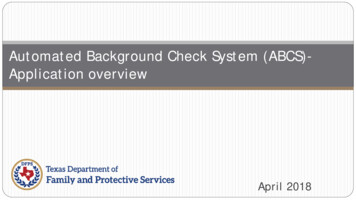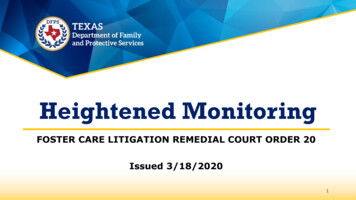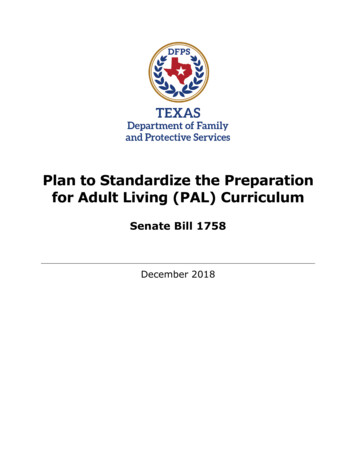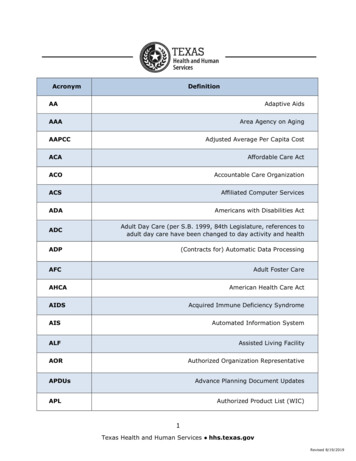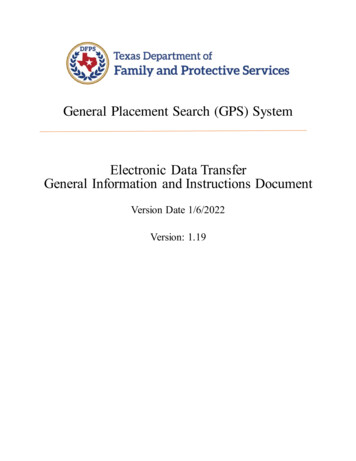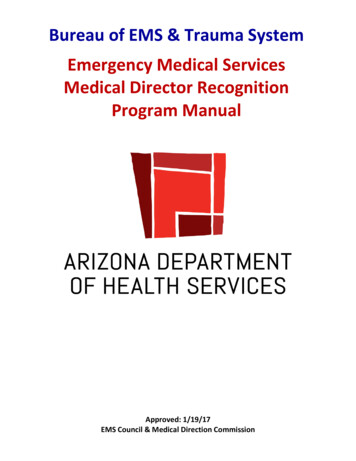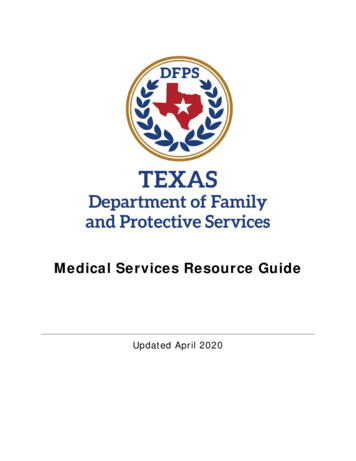
Transcription
Medical Services Resource GuideUpdated April 2020
Table of ContentsTable of Contents . iHealth Services . 1Medical Services Division . 1CPS Nurse Consultants . 1Well Being Specialist (WBS) . 5STAR Health . 7Traditional Medicaid . 8The Medical Consenter Selects a Medical and Dental Provider . 9Texas Health Steps . 9Texas Health Steps Dental Checkups . 10Texas Health Steps Medical Checkups. 11Using the Health Passport . 13What the Health Passport Contains. 13Restrictions on Using the Health Passport . 13Medical Services . 14Immunizations . 14Contraceptive Services . 15Arranging Transportation for Medical Services . 16Destroying Medications . 16Initiating a PMUR. 17Indicators That May Trigger A PMUR . 18The PMUR Process . 18Request for Information about a Child’s Psychotropic Medication. 19Enrollment and Participation in Certain Drug Research Problems . 20Program or Administer Investigational New Drug . 20DFPS Actions if a Physician Recommends Enrollment in a Drug Research Program . 20Documenting Enrollment in Drug Research Program or Administration of InvestigationalNew Drug . 22i
Resource GuidesThe purpose of Resource Guides is to provide information that helps you do your job better. Thisinformation includes reference material, procedures, and guidelines that help you complete the tasks youare required to do by policy.It's important to remember that the information in Resource Guides does not substitute for policy. Wemay sometimes include policy statements, but only to show you the policy to which the information isrelated. We will highlight any policy that actually appears in the Resource Guide and will almost alwaysinclude a link to the actual policy. For example:Per 4222.2 Re-Allowing Placement:If the caseworker learns of a detailed justification for changing the status of and considering placements ina foster family that is on Disallowed Placement status, the caseworker must elevate this considerationthrough the regional chain of command to the regional director.The policy in the handbook always takes precedence over what is in the Resource Guide. We try to keeppolicy and Resource Guides synchronized, but sometimes there is a delay. If you have questions,always follow the policy in the Policy Handbook.Resource Guides provide important information on a range of topics, for the purpose of assisting andguiding staff to: Make essential decisions. Develop strategies to address various issues. Perform essential procedures. Understand important processes. Identify and apply best practices.The information in the Resource Guides is not policy (except where noted), and the actions andapproaches described here are not mandates. You should adapt the way you perform critical tasks to theindividual needs and circumstances of the children and families with whom you work.State office and field staff are working together to identify Resource Guide topics, define the content, anddevelop the appropriate guides. CPS will regularly post Resource Guides as they are developed andupdate them as needed. Check the Resource Guides page, in the CPS Handbook, to see new or revisedGuides.We hope these Guides provide useful information to guide and assist CPS staff in effectively performingtheir job tasks. These Guides, combined with clear and concise policy in the Handbook, should help staffprovide a high level of service to children in Texas.
Medical Services Resource GuideHealth ServicesADDITIONAL RESOURCE GUIDES RELATED TO MEDICAL SERVICES:Primary Medical Needs Resource GuideMedical Consent Resource Guide (includes information related to consent for PsychotropicMedications)Mental Health Resource Guide3 in 30 Resource GuideMedical Services DivisionThe CPS Medical Services Team consists of Well-Being Specialists, Nurse Consultants andProgram Specialists located both in State Office and regionally across the state. The team hasexpertise in the following areas: Medical Consent. Psychotropic Medications. STAR Health. Primary Medical Needs. 3 in 30 (Child and Adolescent Needs and Strengths Assessment/CANS, Texas HealthSteps Medical Check Up and the 3 Day Medical Exam). Health Passport. Psychotropic Medications.CPS Nurse ConsultantsAs Subject Matter Experts, CPS Nurse Consultants provide consultation and education to CPSstaff about health care issues related to children on their caseloads.Nurse Consultants are licensed Registered Nurses. Nurse Consultants at CPS do not function ina clinical direct patient care role (such as administering medications, administering treatments,or supervising caregivers). Nurse Consultants provide healthcare consultations including healthadvocacy, technical advice, and outcome evaluation. They use their substantial specializedjudgment and skill, knowledge and application of the principles of physical, biological andsocial sciences acquired through education as defined in the Texas Nursing Practice Act(http://www.bon.texas.gov/laws and rules nursing practice act.asp).1
Medical Services Resource GuideCPS Nurse Consultants are an important part of the CPS regional team during all stages of CPSservice.Role of CPS Nurse ConsultantsThe primary role of the CPS Nurse Consultant is to provide support and information to CPSstaff. CPS staff can consult with the Nurse Consultant regarding any question, concern, or issuethat may arise related to the medical needs, treatments, medications, or medicalrecommendations pertaining to the children on the CPS staff caseloads.Nurse consultants may not provide direct nursing services. The Department of Family andProtective Services is not designated or licensed as a health care agency. However, professionalnurses are permitted to act as CPS nurse consultants because of their training, skills, andknowledge. The Texas Board of Nursing Rules and Regulations relating to Nurse Education,Licensure, and Practice, does not allow nurse consultants to do direct care, so CPS NurseConsultants are prohibited from providing direct services. Providing direct medical servicescould put the nurses at risk of disciplinary action related to their licensure.Below are some examples of services the nurse consultant may provide:Advocacy for Children's Healthcare NeedsThe CPS Nurse Consultant may advocate for CPS staff and children receiving CPS services bydiscussing the medical needs of children with medical and special needs in all open cases andmaking recommendations. The CPS Nurse Consultant accomplishes this by: Participating in staffing. Engaging in discussions with the children's direct medical providers. Attending meetings, such as Family Team Meetings (FTM), Family Group Conferences(FGC), regional removal staffing, case staffing involving children with medical needs,hospital staffing, child death reviews, etc.Collaboration and Coordination of Health Care Services for ChildrenThe CPS Nurse Consultant may assist CPS staff with collaborating and coordinating health careservices and referrals for children with medical and special needs. The CPS Nurse Consultants,in order to work collaboratively in meeting the needs of each individual child, develop positiverelationships with: STAR Health service managers. Well-Being Specialists. Department of State Health Service case managers. Forensic Assessment Center Network staff.2
Medical Services Resource Guide Child placing agency staff and nurses. Caregivers, including foster parents, fictive kin, relatives, and biological familymembers. Primary care providers (PCPs). Community health care providers. Specialty physicians.Training and Consultation to CPS StaffThe CPS Nurse Consultant may provide training and consultation, to CPS staff in all stages ofservice, regarding medical issues and concerns, such as children with multiple medical needsand psychotropic medications. Although CPS Nurse Consultants do not typically providetraining and consultation to foster parents, kinship caregivers, residential providers, andbiological parents, they are available to provide general medical information and education tothese caregivers during collaborative meetings, such as Family Team Meetings and FamilyGroup Conferences.The CPS Nurse Consultant uses his or her nursing knowledge, skill, and expertise to exploreand investigate issues, questions and concerns that are referred by staff. The CPS NurseConsultant explores caseworker concerns and provides recommendations, using any of thefollowing tasks as appropriate: Nursing assessments to gather helpful data and information. Reviewing medical records, immunization records, proposed treatment plans, etc. Conducting interviews with medical providers, service managers, caregivers, fosterparents, etc. Interpreting medical information and medications Conducting home visits Providing one on one consultation to the caseworker Facilitating referrals to the Forensic Assessment Center Network (FACN)Since CPS Nurse Consultants serve multiple regions, they are unable to make home visits inevery case. They coordinate with CPS staff on a case-by-case basis to prioritize cases in which ahome visit by a nurse is needed.3
Medical Services Resource GuideDocumentation by CPS Nurse ConsultantsThe Nurse Consultant provides information to CPS staff for IMPACT documentation purposes.In some cases, the caseworker will need to assign the nurse consultant as secondary on eachcase so that the Nurse Consultant can document directly into IMPACT. Otherwise, the nursewill email all documentation to the caseworker and the caseworker can enter it into IMPACT.What is Not the Role of the CPS Nurse ConsultantThe following list provides examples of direct services that are outside the scope of the CPSNurse Consultant and which he or she may not provide: Providing direct nursing care to children (examples: injections, dressing changes,gastrostomy tube feeding, or ventilator care). Providing training to non-CPS staff, such as foster parents, kinship caregivers,residential providers, and biological parents either individually or in a classroom setting(examples: training on psychotropic medication, medication management, CPR, FirstAid, care of children with primary medical needs). Sitter services for children in the hospital, their placement, their home, or other setting. Transporting children with primary medical needs (example: out-of-state to an adoptiveplacement, during placement changes).Although CPS Nurse Consultants do not directly provide any of the services listed above, theymay assist CPS staff in accessing these services, when available, through home health agencies,STAR Health, other state agencies, and local resources.How to Request Assistance from Your CPS Nurse ConsultantThe caseworker may request assistance from the CPS Nurse Consultant in person, or by phone,email, or using a referral form. Regional staff should consult with the CPS Nurse Consultantcovering their region regarding the best way to make a referral. The current list of CPS nurseconsultants may be found at: http://intranet/CPS/Regional/nurse.aspIt is important for the caseworker to provide the CPS Nurse Consultant with pertinentinformation regarding the caseworker's concerns. The caseworker is required to follow throughwith the CPS Nurse Consultant's recommendations. If the caseworker has issues, questions, orconcerns about these recommendations, he or she should follow through with the CPS NurseConsultant, the caseworker's supervisor, and the nurse consultant's supervisor.The goal is for caseworkers, supervisors, program directors, and CPS Nurse Consultants towork together as a team and develop a plan with the child's best interest in mind.This information replaces the PSA 10-069 from April 5, 2010.4
Medical Services Resource GuideWell Being Specialist (WBS)Well Being Specialists are subject matter experts who assist CPS staff, caregivers, and STARHealth in addressing basic and specialized behavioral and physical healthcare needs forchildren in all stages of service, including dental, vision, and pharmacy services. The Well BeingSpecialists are housed in local offices throughout the state, and they report to a Well-BeingSpecialist Manager.For any issue related to a STAR Health matter, the first point of contact should be STAR HealthMember Services at 1-866-912-6283. If your issue cannot be resolved by calling MemberServices, and after consultation with DFPS regional chain of command, contact your regionalWell Being Specialist. You can locate your regional Well Being Specialist nal/well- being.asp.WBS duties and responsibilities include, but are not limited to, the following:Troubleshooting for Complex Cases related to Physical and Behavioral Health NeedsParticipate in placement staffing to assist placement staff with resolving barriers to placement,particularly in cases where children have special physical or behavioral health needs. Identify the needs of youth and assist in meeting those needs by making referrals tointernal resources (Education Specialist, Developmental Disability Specialist, NurseConsultant, SSI Coordinator, Eligibility Specialist, etc.) and external resources(Department of Aging and Disability Services, Department of Aging and RehabilitativeServices, Department of State Health Services, Medicaid Transportation Program, etc.). Assist CPS staff and caregivers in resolving medical billing issues. Respond to psychotropic medication concerns through education and coordination. Ensure there is no interruption or delay in services for the child by coordinatingcommunication between medical providers, STAR Health, and CPS staff. Assist workers in obtaining prescription medications for children and young adults. Identify medical barriers to placement and request recommendations for on-goingtreatment through consultation with medical staff. Work closely with caseworkers and eligibility staff around Medicaid eligibility issues. Assist CPS staff with out of state access to healthcare services for children placedthrough the Interstate Compact on the Placement of Children (ICPC) process. Assist CPS staff and caregivers in addressing any denial of services by Star Health. Assist with transplant coordination with out of state hospitals.5
Medical Services Resource GuideCPS Liaison to Superior/Cenpatico Serve as Subject Matter Experts for STAR Health, Medical Consent policy, Medicaidpolicy, and the “3 in 30” (Texas Health Steps, CANS and 3 Day Medical Exam). Respond to Star Health inquiries, including medical consenter confirmations, servicemanagement denials, refusal of Texas Health Steps Outreach by Kinship family, Eligibility issues, andoutreach to staff. Manage provider complaints and quality of care concerns.Child Specific Staffings Coordinate and facilitate Primary Medical Needs (see the Primary Medical NeedsResource Guide) and Medical staffings for any child entering CPS conservatorship orchanging placements, who has specialized medical needs, for the purpose of ensuringthe child's medical needs are met. Participate in placement staffings with Star Health and Placement to trouble shootbarriers to placements for medically fragile youth. Participate as needed in removal staffings, Circles of Support, Family Team Meetings,Family Group Conferences, Community Resource Coordination Groups, Permanency Roundtables,Permanency Conferences, Special Needs Staffings, Hospital Case Reviews, and MedicalStaffings.Training/Presentations Provide trainings and present information during Unit meetings or to external agencies,such as Child Placing Agencies. Provide Staff Development training on community resources available for health-relatedissues.Additional Duties Assist with referrals for Psychotropic Medication Utilization Reviews (PMUR) andensure court orders for medication reviews are submitted to Superior when requested. Assist STAR Health when it is unable to locate a youth (due to placement change,runaway status, incarceration, etc.) and provide updated contact information andcurrent legal status.6
Medical Services Resource Guide Participate in a variety of State Office workgroups, projects, and meetings regardingnew programs and policies to be developed through the implementation phase withregional staff.STAR HealthSee 11200 Medical and Dental Services.STAR Health is a statewide, comprehensive health care system designed to coordinate andimprove healthcare for the children in DFPS conservatorship. Medicaid services through STARHealth are available to: Children in DFPS conservatorship (under age 18). Young adults in DFPS extended foster care (ages 18 through 20). Young adults who were previously under DFPS conservatorship and have returned tofoster care through voluntary foster care agreements (ages 18 through 20). Young adults eligible for Medicaid for Former Foster Care Children (FFCC) willcontinue coverage through the STAR Medicaid Managed Care plan of their choice fromage 21 through the month of their 26th birthday.STAR Health is required to ensure Texas Health Steps medical and dental checkups for all DFPSchildren who are enrolled in STAR Health. Children in DFPS conservatorship are required toreceive an initial Texas Health Steps medical checkup within 30 days of entering DFPSconservatorship. The Child and Adolescent Needs and Strengths Assessment (CANS) is alsorequired within 30 days of a child entering DFPS conservatorship. STAR Health behavioralhealth network clinicians, certified in administering the CANS, complete the CANS assessmentstatewide, except in areas of the state where Community Based Care has been implemented.For additional information on CANS, see:3 in 30 Resource Guide6431.1 Child and Adolescent Needs and Strengths (CANS) Assessment and Family Strengthsand Needs Assessment (FSNA).For details on medical requirements, see Minimum Standards and Guidelines for Child-PlacingAgencies, DFPS Child Care Licensing Division, §§749.1151 and 749.1401.For help finding a health care provider who participates in STAR Health, the child'scaseworker, caregiver, or medical consenter contacts STAR Health at 1-866-912-6283.Issues and concerns related to STAR Health are brought to the attention of the well-beingspecialist for the DFPS region involved.7
Medical Services Resource GuideThe Medical Consenter Selects a Primary Care Provider (PCP)Caregivers work with the child’s medical consenter to choose a primary care provider (PCP).Only a medical consenter can legally choose a child’s PCP. The PCP can be a doctor, a nurse, ora clinic that is chosen from STAR Health's provider directory.Soon after enrollment in STAR Health, the caregiver receives a PCP selection form in the mail.As an enrolled STAR Health medical provider, the PCP can complete Texas Health Stepscheckups.When the Consenter Is the CaregiverOnce identified, the medical consenter: Calls STAR Health at 1-866-912-6283. Faxes or mails the form back to STAR Health, following the instructions on the PCPselection form. If the medical consenter calls STAR Health, the medical consenterverifies that he or she is the medical consenter by providing: His or her Person Identification (PID) number. The child’s PID number or Medicaid number and child’s date of birth (DOB).When the Consenter Is Not the CaregiverIf the medical consenter is not the caregiver, the medical consenter discusses the choice of a PCPwith the caregiver, then contacts STAR Health by phone, mail, or fax, as noted above.QuestionsFor questions about STAR Health call 1-866-912-6283 or visit STAR Health.Traditional MedicaidSee 11200 Medical and Dental Services.The 83rd Texas Legislature directed HHSC to transition traditional fee for service Medicaidpopulations to a Medicaid managed care program. Most children and youth in DFPSconservatorship receive Medicaid services through The Medicaid STAR Health managed careprogram. Children who are not eligible for enrollment in STAR Health, however, receive theirTexas Health Steps checkups and other medical care through the traditional Medicaid fee for8
Medical Services Resource Guideservice program. Under this program, the state pays Medicaid enrolled providers for each unitof service provided to Medicaid enrolled beneficiaries.Children covered include: Children and youth who reside in Texas Juvenile Justice facilities. Children and youth under who reside in the Truman W. Smith center. Children and youth in an out-of-state placement. Children and youth in an ICF/IID/Nursing Home. Children or youth in a pre-consummated adoption and receiving adoption subsidy orpermanency care assistance. Children and youth with an unauthorized absence/runaway.The Medical Consenter Selects a Medical and DentalProviderCaregivers work with the child’s medical consenter to choose medical and dental providers forthe child.Assistance with finding medical and dental providers is available by: Calling an outreach counselor with Texas Health Steps at 1-877-THSTEPS (1-877-8478377). Referring to the provider guide published by the Texas Medicaid and HealthcarePartnership (TMHP). Using the online Provider search tool at www.tmhp.com.Texas Medicaid & Healthcare Partnership (TMHP) website is the Claims Administrator forTexas Medicaid and oversees claims administration and provider enrollment for the Medicaidfee for services or Traditional Medicaid program.Texas Health StepsTexas Health Steps -- known in federal law as the Early and Periodic Screening, Diagnosis, andTreatment (EPSDT) program -- is the child health component of Medicaid. Texas Health Stepsmedical and dental checkups provide preventive health care for children, teens, and youngadults age 20 and younger.9
Medical Services Resource GuideWhen youth leave DFPS conservatorship and reunify with their parent(s), they should still haveTexas Health Steps medical and dental checkups on a regular and preventive basis.The Texas Health Steps Comprehensive Care Program (CCP) requires that:the state provides to children, teens, and young adults who are eligible for Texas Health Stepsall medically necessary treatment for the correction of physical, psychological, or intellectualproblems, when federal financial participation is available; and treatment be provided even ifthe service is not available to recipients of the state's traditional Medicaid plan.Further information about Texas Health Steps can be obtained by: Calling STAR Health at 1-866-912-6283. Calling an outreach counselor for Texas Health Steps at 1-877-THSTEPS (1-877-8478377). Visiting the STAR Health page of the DFPS website. Visiting the Texas Health Steps page of the Texas Department of State Health Services(DSHS) website.Texas Health Steps Dental CheckupsSee 11212 Initial Texas Health Steps Dental Checkup.Children are required to receive Texas Health Steps dental checkups starting at six months of age.Children may be referred at any age to a dentist who is enrolled in Texas Health Steps, when a TexasHealth Steps medical checkup identifies the need for a dental referral.Dental ExampleJane and John Doe came into DFPS conservatorship and were enrolled in STAR Health on March 15.Jane's birthday is May 1; she was 6 years old when she came into conservatorship.Jane’s initial Texas Health Steps dental checkupmust be scheduled byJane’s initial Texas Health Steps dental checkup isconsidered overdue Jane’s next Texas Health Steps checkup isconsidered overdue inApril 14, 30 days after she came intoconservatorshipMay 15, 61 days after she came intoconservatorshipFebruary, nine months after the initial checkup.10
Medical Services Resource GuideJohn's birthday is December 10; he was 3 months old when he came into conservatorship (March 15). Heturns 6 months old on June 10.July 10, 30 days after he turns 6 months oldJohn's initial Texas Health Steps dental checkupmust be scheduled by August 10, 61 days after he turns 6 months oldJohn's initial Texas Health Steps dental checkupis considered overdue December, six months after the initial checkupJohn’s next Texas Health Steps dental checkup isdue in March, nine months after the initial checkupJohn’s next Texas Health Steps dental checkup isconsidered overdue in Texas Health Steps Medical CheckupsSee 11211 Initial Texas Health Steps Medical Checkup.STAR Health is required to help ensure that a child receives timely medical checkups by a credentialedSTAR Health medical provider, as follows:An initial Texas Health Steps medical checkup must be obtained within 30 days of entering DFPSconservatorship.Medical checkups must be obtained annually as outlined in the Texas Health Steps Periodicity Schedule,unless required more frequently by the child's medical provider.Medical checkups must be scheduled one year after the previous checkup and no later than the child'snext birthday.Children who are younger than 36 months of age will receive medical checkups more frequently, asoutlined in the Texas Health Steps Periodicity Schedule.What to Take to a Medical CheckupWhen accompanying a child on a visit for a medical checkup, the caseworker takes the child's: Medicaid ID; STAR Health ID card, if appropriate.11
Medical Services Resource Guide Pertinent medical records. Immunization record.Exception to Periodicity Schedule for Initial Texas Health StepsCheckupThe Texas Medicaid Provider Procedures Manual includes language that explains that a Texas HealthSteps checkup will be a covered benefit for children entering DFPS conservatorship, even if they recentlyhad a visit with their medical provider. (5.3.7 Exception-to-Periodicity Checkups).Example of Initial Texas Health Steps Medical CheckupsJane and John Doe came into DFPS conservatorship and were enrolled in STAR Health on March 15.Jane's and John's initial Texas Health Stepsmedical checkups must be completed no laterthan April 14, 30 days after she came intoconservatorshipJane's and John's initial Texas Health Stepsmedical checkups are considered overdue on April 15, 31 days after she came intoconservatorshipSubsequent medical checkups should be in accordance with the Texas Health Steps Periodicity Schedule, .Medical checkups must be obtained annually as outlined in the Texas Health Steps Periodicity Schedule,unless required more frequently by the child’s Texas Health Steps provider.Medical checkups must be scheduled one year after the previous checkup and no later than thechild’s next birthday.Children who are younger than 36 months of age will receive medical checkups through Texas HealthSteps more frequently, as outlined in the Texas Health Steps Periodicity Schedule.QuestionsFor further information about Texas Health Steps: Call a Texas Health Steps outreach counselor at 1-877-THSTEPS (1-877-847-8377).12
Medical Services Resource Guide Visit the Texas Health Steps page of the Texas Department of State Health Services (DSHS) website.Using the Health PassportSee 11240 Using the Health Passport.The Health Passport is an important feature of the STAR Health Plan. It is a Web-based, electronic systemfor storing and retrieving a child’s health information. Healthcare providers, caregivers, and authorizedCPS staff use the Health Passport to manage a child’s health care needs.What the Health Passport Cont
nurses are permitted to act as CPS nurse consultants because of their training, skills, and knowledge. The Texas Board of Nursing Rules and Regulations relating to Nurse Education, Licensure, and Practice, does not allow nurse consultants to do direct care, so CPS Nurse Consultants are prohibited from providing direct services.
